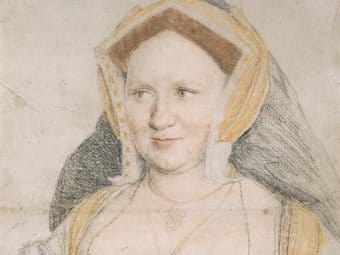Detail of a portrait of Catherine of Aragon, painted by Lucas Horenbout (1490–1544) in 1525. Catherine married Henry VII’s son Arthur in 1501, but the heir apparent died the following year. In 1509, shortly after her father-in-law died, Catherine married Arthur’s younger brother, who had succeeded his father to become King Henry VIII. The portrait shows Catherine’s pet monkey, evidently something of a family tradition.
HE was a prince, sad, serious, and full of thoughts and secret observations; and full of notes and memorials of his own hand, especially touching persons; as whom to employ, whom to reward, whom to inquire of, whom to beware of, what were the dependencies, what were the factions, and the like; keeping (as it were) a journal of his thoughts. There is to this day a merry tale: that his monkey (set on as it was thought by one of his chamber) tore his principal note-book all to pieces, when by chance it lay forth whereat the court, which liked not those pensive accounts was almost tickled with sport.
Abridged
Questions for Critics
1. What is the author aiming to achieve in writing this?
2. Note any words, devices or turns of phrase that strike you. How do they help the author communicate his ideas more effectively?
3. What impression does this passage make on you? How might you put that impression into words?
Based on The English Critic (1939) by NL Clay, drawing on The New Criticism: A Lecture Delivered at Columbia University, March 9, 1910, by J. E. Spingarn, Professor of Comparative Literature in Columbia University, USA.
Précis
Sir Francis reveals that the king not only employed spies but did a little spying himself, vetting his courtiers personally, watching them closely and jotting down their doings in a private journal. The royal household did not like this surveillance, and members were highly amused when the king’s pet monkey — possibly under their coaxing — tore the journal up one day. (60 / 60 words)
Sir Francis reveals that the king not only employed spies but did a little spying himself, vetting his courtiers personally, watching them closely and jotting down their doings in a private journal. The royal household did not like this surveillance, and members were highly amused when the king’s pet monkey — possibly under their coaxing — tore the journal up one day.
Variations: 1.increase the length of this precis to exactly 65 words. 2.reduce the length of this precis to exactly 55 words. 3.introduce one of the following words into the precis: despite, if, may, must, otherwise, ought, since, who.
Archive
Word Games
Jigsaws Based on this passage
Express the ideas below in a single sentence, using different words as much as possible. Do not be satisfied with the first answer you think of; think of several, and choose the best.
Spinners Find in Think and Speak
For each group of words, compose a sentence that uses all three. You can use any form of the word: for example, cat → cats, go → went, or quick → quickly, though neigh → neighbour is stretching it a bit.
This exercise uses words found in the accompanying passage.
1 Dependency. Lay. Much.
2 Fame. Suspicion. Tale.
3 Enemy. Many. One.
Variations: 1. include direct and indirect speech 2. include one or more of these words: although, because, despite, either/or, if, unless, until, when, whether, which, who 3. use negatives (not, isn’t, neither/nor, never, nobody etc.)
Homophones Find in Think and Speak
In each group below, you will find words that sound the same, but differ in spelling and also in meaning. Compose your own sentences to bring out the differences between them.
This exercise uses words found in the accompanying passage.
High Tiles Find in Think and Speak
Make words (three letters or more) from the seven letters showing below, using any letter once only. Each letter carries a score. What is the highest-scoring word you can make?
Your Words ()
Post Box : Ask Nicholas
Grok : Ask Grok
You are welcome to share your creativity with me, or ask for help with any of the exercises on Clay Lane. Write to me at this address:
See more at Post Box.
If you like what I’m doing here on Clay Lane, from time to time you could buy me a coffee.
Buy Me a Coffee is a crowdfunding website, used by over a million people. It is designed to help content creators like me make a living from their work. ‘Buy Me a Coffee’ prides itself on its security, and there is no need to register.
Related Posts
Dutch scholar Desiderius Erasmus urged Fausto Andrelini not to miss out on England’s enchanting contribution to good manners.
Picture: By Hans Holbein the Younger (?1497-1543), via Wikimedia Commons. Licence: Public domain.. Source.
Posted June 29 2022
Henry VIII and his mistress Anne Boleyn were disappointed once again in their hopes of catching Thomas More with his fingers in the till.
Picture: From the Metropolitan Museum of Art, New York, via Wikimedia Commons. Licence: Public domain.. Source.
Posted April 20 2021
On July 5th, 1535, the night before he was to be executed by order of King Henry VIII, it seemed that Sir Thomas More was the only man in the Tower of London who was happy.
Picture: By Claudius Jacquand (1808-1878), via Wikimedia Commons. Licence: Public domain. Photo by Xavier Caré.. Source.
Posted December 4 2020






